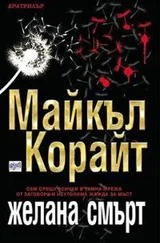She turned back to the car and reached for Oltamu’s phone. Her hands hovered just above it, then drifted left, and she popped the center console open and found Shannon Beckley’s phone.
It took her two tries to grasp it in her bloody fingers, and by the time she had it and stepped away from the car, the kid was at the foot of the bridge.
“Dax!” she screamed.
He looked up. He was limping badly, and his left arm hung awkwardly, obviously broken but disregarded, like a dragging muffler. The gun was in his right hand, but she was too far away to fear being shot.
“Go get it!” Abby shouted, and then she pivoted back and whirled forward and sent Shannon Beckley’s phone spinning into the air. It sailed in a smooth arc out above the river and then down into it.
Dax watched it splash and sink.
He stood there and looked at the water, and then, finally, he lifted his head to face Abby.
Duck, she commanded herself, but her body didn’t obey. She just stood there on the other side of the river, hands bound in front of her, blood running down her arms.
The kid raised his gun. Abby waited for the shot.
None came. Instead, he held it across his forehead, and for a bizarre moment she thought he was going to take a suicide shot. Then she realized that he was offering a salute. He held the pose for a moment, then turned and limped back to the car. As the train whistle shrieked again, he backed the Challenger out and pulled up the hill. The train had stopped before blocking the road, granting him an escape route.
Abby stood where she was until the car crested the hill and vanished, then she sank down into the grass.
She looked back at the bridge, at that narrow window between train and steel girder, and wondered how wide it had been when she slipped the Jeep through. She stared at that for a long moment, and then she struggled upright and went to Shannon Beckley. Abby extended her wrists.
“Can you untie me?”
Shannon looked at Abby’s face, then down to her hands. “Yes,” she said simply, and she went to work on the knots with nimble fingers. It didn’t take her long. Abby watched the cord fall away, and she remembered the strangling cord at her throat, her feet on the dash and her back arched. She flexed her fingers, then reached out and plucked the black baseball cap off Shannon Beckley’s head. She studied it and found the pinhole-size camera hidden just beneath the bill, beneath the odd silver stitching that drew the eye of the observer toward the top of the hat. Was he watching? No. But he would go back. He would go back to study what he’d missed.
She was sure of that.
Abby angled the bill of the cap at her face and then lifted her middle finger up beside it. Then she stepped back from the Jeep, turned, and pulled her arm back, prepared to fling the hat as far into the river as she could.
“The police will need it,” Shannon Beckley said.
Abby stopped. Sighed and nodded. Yes, they would. But damn, how much she wanted to watch it drown.
She tossed the hat on the driver’s seat. Sirens were approaching from somewhere on the campus and somewhere on the other side of the river. She ignored them, studying the plastic zip ties that held Shannon’s wrists together.
“I’ll need to cut that. You have anything that will work?”
“Get the phone,” Shannon said.
Abby was puzzled. Shannon had seemed so composed, but maybe she was delirious. Abby wasn’t cutting those ties with a phone. “No,” Abby told her patiently and began to root around in the console in search of a better tool.
“Get the phone,” Shannon said, each word firm as a slap, and when Abby looked up, she saw that Shannon was staring over her shoulder. Abby turned and saw the dog crouched at the tree line, head up, ears back, wary but intrigued.
She picked up Oltamu’s phone and walked away from the car. The sirens were growing louder, and someone was screaming at her from across the river, but she didn’t look away and neither did the dog. Abby went as close as she dared and then sat in the grass and extended a bloody hand.
“Hobo,” she said. “Come see me.”
Tara has been many things and is becoming many more. Each day seems to bring a new identity.
First she was the vegetable, the brain-dead girl, and then she was the locked-in girl, and then, within hours of learning that Shannon was alive, Tara was the Coma Crime Stopper.
This is because of the story Shannon told, giving credit to her sister’s nonverbal lie.
People look at her and think she’s helpless. But from that bed, she saved me without speaking a word.
The media loved that quote. They directed feature coverage to Tara on every network. Their attention, as is its way, swells and breaks. A van with bombs is found in DC, and a hurricane is howling toward Texas. The Coma Crime Stopper is forgotten.
Then the contents of the phone are revealed.
Photos, files, videos of an electric vehicle produced by a company called Zonda, which is the name of an Argentinean wind that blows over the Andes Mountains. Most of the files are complex equations or sets of computer algorithms, an FBI agent from Boston named Roxanne Donovan tells Tara and her family. The photos and videos are mostly of cars on fire. Zonda prototypes.
The product of German design, American manufacturing, and international investing, Zonda is on the verge of being about so much more than cars. The company has already agreed to a multibillion-dollar contract with one of the world’s largest airplane builders, military contracts are expanding, and, one week after a woman with a knife arrived to talk to Tara Beckley — and kill her — the company was to have its initial public offering. All has been trending positively for Zonda with the exception of one troublesome engineer who, in the months before the IPO, began to reach out to a handful of select individuals, informing them of rumors and promising documentation. What he could show, he told them, was the equivalent of the Volkswagen diesel-emissions scandal that cost the company billions in fines and led to the criminal indictments of nine executives. One of the world’s most exciting young companies had been built on a carefully protected lie, and he was prepared to share evidence of that or remain silent about it — whichever was more profitable.
“I’d love to tell you that Amandi Oltamu was noble,” Roxanne Donovan says to Tara. “But our early information suggests that he was only looking for a payday.”
This disappoints Tara. Donovan is right; Tara wants him to be noble. She wants to have his death and her own suffering wrapped in righteousness.
She won’t get what she wants.
“He made at least three offers,” Donovan continues. “Two were to people who had stakes in the company. Extortion efforts, basically. When those demands weren’t met, he went in a different direction. He contacted a rival.”
The rival, it seemed, had gotten in touch with a woman named Lisa Boone.
The source of the baby-faced kid in the black hat is less clear. He is the son of a killer, seventeen or eighteen or possibly nineteen years old, and Roxanne Donovan will say only that the Bureau is working on leads, many of them generated by interviews with Abby Kaplan. Lisa Boone is dead, shot on the railroad bridge over the Willow River where Tara had once nearly died herself, but the young killer is missing. The best lead there, Donovan tells them, involves a rural airport in Owls Head. An isolated hangar on the Maine coast, it serves as a touchdown point for the private-jet set. On the morning after the killing on the bridge, a small jet from Germany landed in Owls Head and refueled. Its lone passenger was an attorney from Berlin. The plane took on another passenger at Owls Head, a young man with a limp and one arm in a sling. The aircraft then flew to Halifax, and from Halifax to London, changing flight plans each time. Upon the plane’s arrival in London, the young passenger from America disembarked after informing the pilot that the German attorney was sleeping and wasn’t to be bothered. By the time the pilot discovered the man wasn’t sleeping but dead, the unknown American was gone.
Читать дальше






![Майкл Корита - Те, кто желает мне смерти [litres]](/books/396555/majkl-korita-te-kto-zhelaet-mne-smerti-litres-thumb.webp)





